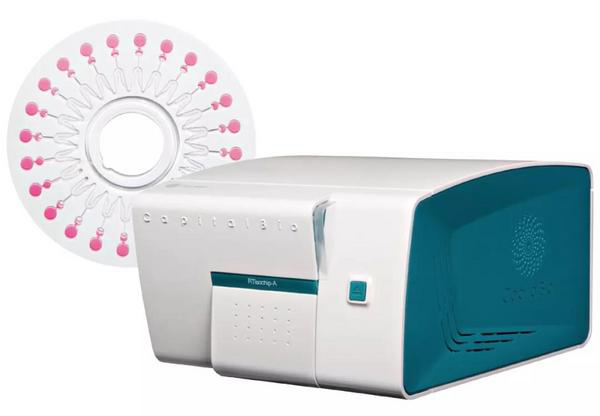CapitalBio’s pathogen nucleic acid detection project wins biomedical engineering award
2019-11-15

CapitalBio Corporation's isothermal amplification microfluidic pathogen nucleic acid detection chip system project' wins second prize for technological invention at the Huang Jia-si BME Award on November 15.
The presentation ceremony of the Huang Jia-si BME Award, sponsored by the Chinese Society of Biomedical Engineering, took place in Jinan city, East China’s Shandong province, on November 15. The award is named after a Chinese cardiothoracic surgeon and medicinal educator, known for being the founder of biomedical engineering.

Isothermal amplification microfluidic pathogen nucleic acid detection chip system of CapitalBio Corporation
A project of CapitalBio Corporation titled 'Research, Development and Application of Isothermal Amplification Microfluidic Pathogen Nucleic Acid Detection Chip System' won the second prize for technological invention at the Huang Jia-si BME Award.
The project was completed with the support of the '863 program', or State High-Tech Development Plan. With breakthroughs in a series of key technologies, it created the first isothermal amplification microfluidic pathogen nucleic acid detection chip system, filling the gap in domestic micro-nano bacteria biomedical detection devices and medical instruments. The project obtained 13 invention patents, including 11 Chinese invention patents and two US invention patents, published eight research articles, and formed two enterprise technical standards.
In July 2019, the company’s high-throughput isothermal amplification nucleic acid analyzer obtained the national medical device registration certificate. The instrument features high-throughput, fast, accurate and efficient testing and can simultaneously and independently detect multiple samples, so as to meet the current clinical needs of large and medium-sized hospitals in large-scale detection for infectious disease diagnosis.
Compatible with a variety of microfluidic chip kits - for example the nucleic acid detection kits for respiratory pathogens - the analyzer will simultaneously detect multiple pathogenic microorganisms related to respiratory tract infections, and reduce the time from obtaining a patient sample to giving a test report to less than two hours.
In addition to respiratory pathogens, the analyzer can perform rapid detection of infectious diseases caused by respiratory viruses, fungi, diarrhea pathogens, and bacterial resistance. It is also used for multiple clinical testing purposes, including detection of digestive tract pathogens and wound infection pathogens.
The analyzer can also be applied to a variety of fields, such as animal disease-related pathogen detection, aquatic product-related pathogen detection, food pathogenic microorganism detection, and agricultural product GMO detection.
Since its launch in 2015, the chip system has been applied in more than 300 hospitals in 31 provinces, municipalities and autonomous regions nationwide and more than 300,000 tests have been completed. It has helped save the lives of many critically ill patients, reduced incidents of antibiotic abuse and bacterial resistance, and has been praised by doctors and patients for its economic and social benefits.

 Facebook
Facebook WeiXin
WeiXin CONTACT US
CONTACT US










 Tsinghua Holdings works hard for better ecological environment
Tsinghua Holdings works hard for better ecological environment